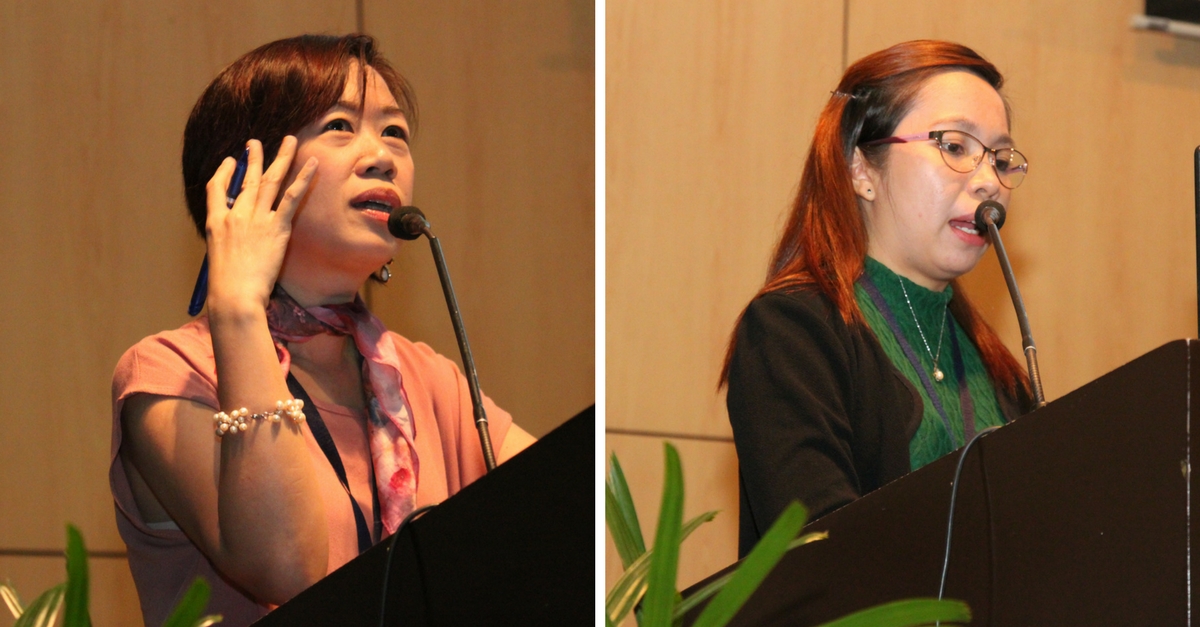 Dr. Tina Clemente (L) and Ms. Ivy Ganadillo (R) at the conference. Photo by Kaisa para sa Kaunlaran.
Dr. Tina Clemente (L) and Ms. Ivy Ganadillo (R) at the conference. Photo by Kaisa para sa Kaunlaran.
A student and an associate professor of the UP Asian Center presented their research at a conference, “Chinese in the Philippines: New Studies, Current Issues, Future Directions,” which was held from 12 to 13 January 2017, Ricardo and Dr. Rosita Leong Hall Auditorium, Ateneo de Manila University, Philippines.
Ms. Ganadillo, a China Major at the UP Asian Center, presented “A South-South Migration: Narratives of Selected New Chinese Migrants in the Philippines,” which is part of her MA thesis. Below is an abstract of her research:
A “South-South” dynamics or the migration flow from a low-income to another low-income economy can be used to describe the current migration movement between the China and the Philippines. The World Migration Report (2013) suggests that while the economic aspect of “South-South” migrants is important in the discussion, the individual migrants’ lives and personal stories are significant factors often overlooked. The Chinese migration to the Philippines is not a new trend but the studies on contemporary Chinese migration are scarce and recent. This study aims to contribute to the understanding of the South-South migration concept through exploring and analyzing the narratives of selected new Chinese migrants (NCMs) in the Philippines. It aims to objectively describe who the new migrants are and what influence them to stay and live in another developing country. The results of the study show that although the economic factors cannot be taken away in the process of migration, it also shows that social and normative factors are important factors influencing the migrants’ decision. This study does not generalize the narratives of the NCMs in the Philippines. It intends to lay a groundwork that may lead to future studies and increase knowledge in the field of Chinese migration to the Philippines in particular, and the Overseas Chinese, in general.
New Chinese Migrants refer to those who came to the Philippines from 1978 onwards. And Ms. Ganadillo's respondents were those who arrived in the country between the 1990s and the early 2000s.
Joining her is Dr. Tina S. Clemente, Associate Professor at the UP Asian Center. The title of her paper is “China Studies in the Philippines: Oral History Research." Below is an abstract:
The field of China Studies has been accorded increasing attention over the years, dovetailing the rise of China. While the tendency towards Sinicization to define the boundaries of acceptable knowledge that the field should have is understandable, the evolution of China Studies in different countries and the ensuing narratives cannot be discounted. These narratives enrich rather than dilute the field. In the interest of contributing the Philippine narrative, the study queries what the state of China Studies in the Philippines is. The research aims to analyze China Studies in the Philippines by interrogating the oral histories of senior experts in the Philippines in the fields of foreign relations, literature, media, and development and critically engage the academic literature and the discourses in the field. The approach applied in this current project focuses on narrative analytics, which underscore varied contexts (e.g. historical, cultural, political) that shape life histories, which, in turn, shape the larger narrative. The research contributes to an evaluation of the field of China Studies in the world in aid of enriching the field epistemologically. Furthermore, a more nuanced appreciation of contextual paths of the evolution of China knowledge in the Philippines allows a self-reflective analytical modality in understanding Philippine perspectives on developments in Philippines-China relations.
Dr. Clemente served on the organizing team and was a master of ceremonies during the conference as well.
Also taking part in the conference were Yoko Asato, alumna of the UP Asian Center, who presented, “Identification Process and Chineseness: In Comparison with Peranakans in Singapore and Tsinoys in the Philippines.” She is a Ph.D. candidate in — and representing — Doshisha University in Kyoto, Japan.
Dr. Lily Rose Tope — Professor at the UP Department of English and Comparative Literature and a member of the editorial board of Asian Studies: Journal of Critical Perspectives on Asia, which is published by the UP Asian Center — presented “Chinatown as Dystopia in Charleson Ong’s Blue Angel, White Shadow.”
The UP Asian Center offers an MA program in Asian Studies with a country specialization for China.
ABOUT THE CONFERENCE
The conference was organized by the Kaisa Para sa Kaunlaran; the Ricardo Leong Center for Chinese Studies; the Department of History and the International Programs Office (IPO) of the University of Amherst Massachusetts; Oishi; the School of Social Sciences, Ateneo de Manila University; and the Five College Consortium, a group consisting of several universities and academics in Western Massachusetts.
It was convened by Dr. Richard Chu of the University of Amherst, Massachusetts, and Teresita Ang See of Kaisa Para sa Kaunlaran, a “leading resource organization that advocates the proactive and sustainable participation of the Tsinoy community in local and national development.”
The Asian Center offers M.A. degrees in Asian Studies with four fields of specialization: Northeast Asia, Southeast Asia, South Asia, and West Asia. The Center also has an M.A. program in Philippine Studies that allows students to major in Philippine society and culture, Philippine foreign relations, or Philippine development studies. The Center offers a Ph.D. program in Philippine Studies in conjunction with the College of Arts and Letters and the College of Social Sciences and Philosophy. For an overview of these graduate programs, click here. The Asian Center also publishes Asian Studies: Journal of Critical Perspectives on Asia, the latest issue of which can be downloaded at the journal's website. For other news and upcoming events at the Asian Center, click here.

